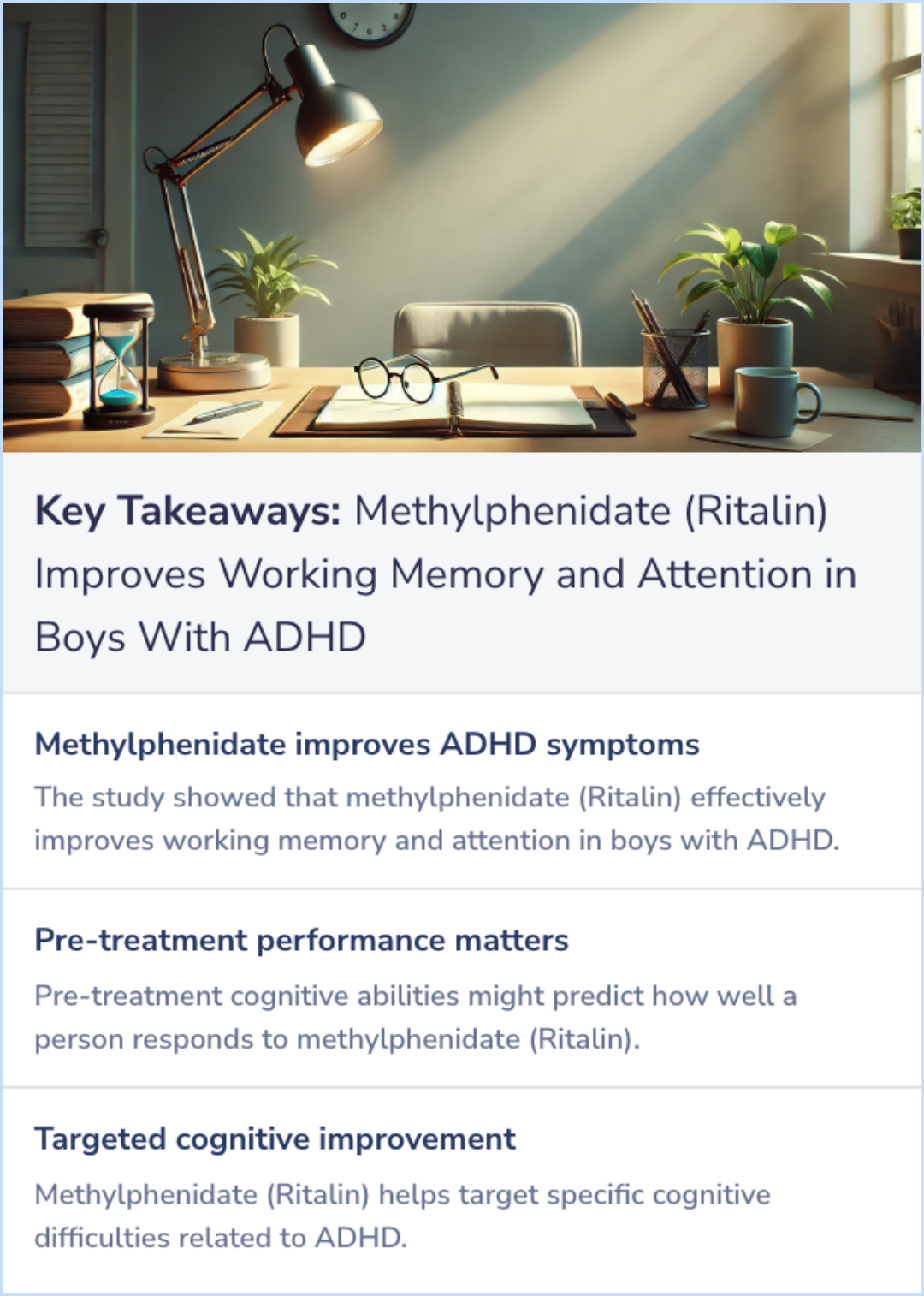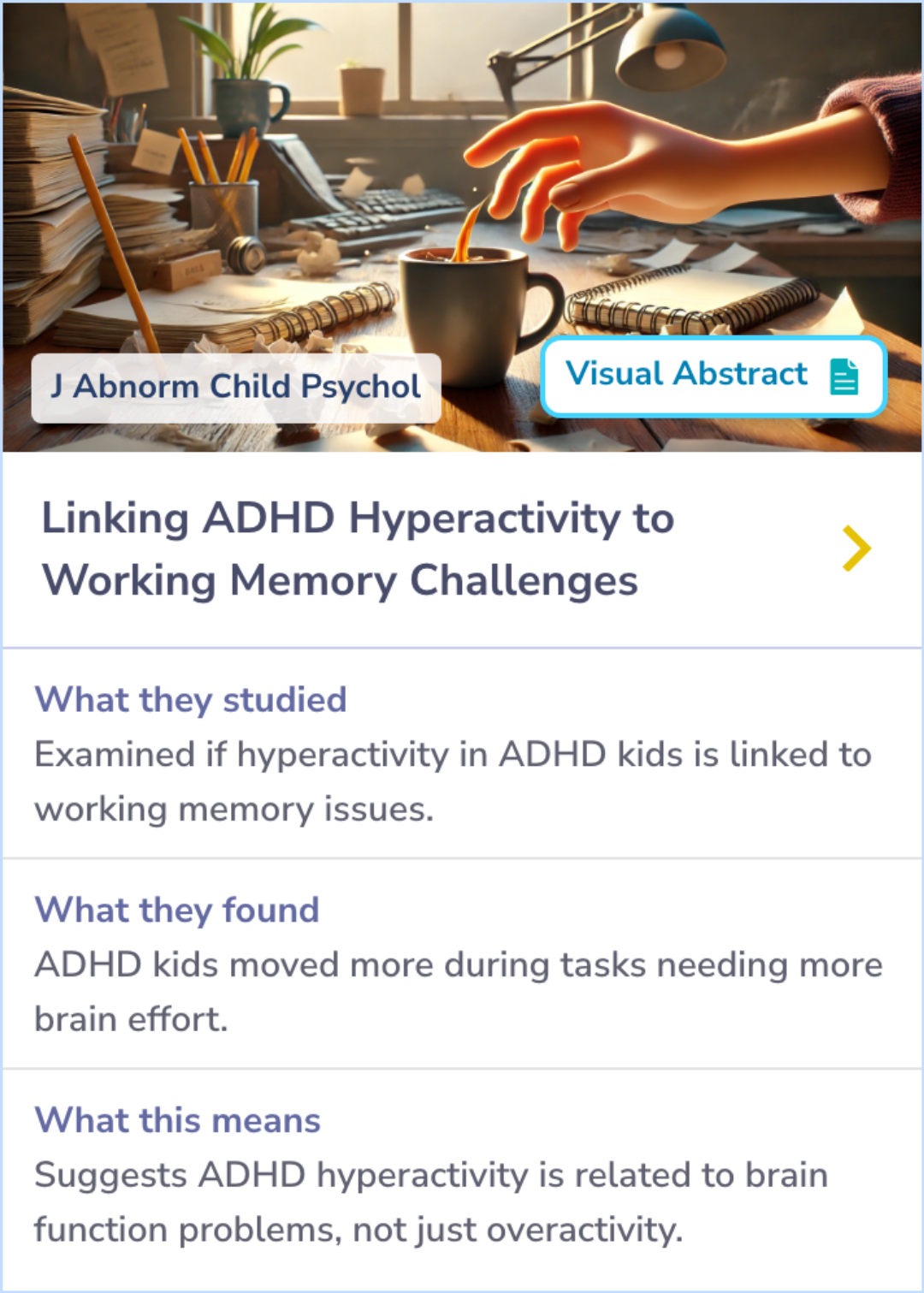Ritalin Paper Database
Visual Abstract
Methylphenidate improves working memory and set-shifting in AD/HD: relationships to baseline memory capacity
Methylphenidate (Ritalin) Improves Working Memory and Attention in Boys With ADHD
October 18, 2024
author
Mehta MA, Goodyer IM, Sahakian BJ
journal
J Child Psychol Psychiatry
Date Published
2004 Feb
Why link to a visual abstract?
What is a visual abstract?
Original

Study Summary
🔬
What They Studied
The main research question was to understand how an acute dose of methylphenidate affects cognitive functions in boys with ADHD.
💡
What They Found
They found that methylphenidate improved spatial working memory, attentional-set shifting, and visual-search task performance.
📚
What This Means
These findings suggest that methylphenidate (Ritalin) can help improve cognitive difficulties and clinical symptoms in boys with ADHD, aligning with current evidence that it is an effective treatment for ADHD.
Study Summary
Study Overview
Abstract: background
Catecholamine stimulant drugs are highly efficacious treatments for attention deficit/ hyperactivity disorders (AD/HD). Catecholamine modulation in humans influences performance of numerous cognitive tasks, including tests of attention and working me...more

Study Summary
Methods
In this study, 14 boys, averaging around 11 years old, were given either methylphenidate (Ritalin) or a placebo. The study was double-blind, meaning neither the participants nor the researchers knew who received the actual drug. The children were tested using questionnaires filled out by their parents and teachers.
Their IQ was assessed, and specific cognitive tasks were selected to measure areas like memory, planning, and attention. All participants met the criteria for ADHD under DSM-IV guidelines.
Their IQ was assessed, and specific cognitive tasks were selected to measure areas like memory, planning, and attention. All participants met the criteria for ADHD under DSM-IV guidelines.
Abstract: methods
Here we present a double-blind, placebo-controlled study of the cognitive effects of an acute dose of methylphenidate (c. .5 mg/kg) in 14 boys aged 10.86 (+/- 1.19) years meeting criteria for DSM-IV AD/HD. Current behaviour was ascertained using Conn...more

Study Summary
Results
The results showed that methylphenidate (Ritalin) significantly improved performance in tasks that tested spatial working memory, attention, and visual searching abilities. The drug seemed particularly effective for those who struggled with attention-based tasks while on the placebo.
Additionally, there was a noticeable link between working memory capacity and improvement in these cognitive tasks, indicating that those with greater challenges saw the most benefit from the treatment.
Additionally, there was a noticeable link between working memory capacity and improvement in these cognitive tasks, indicating that those with greater challenges saw the most benefit from the treatment.
Abstract: results
Methylphenidate improved spatial WM, attentional-set shifting and visual-search task performance. Correlational analyses suggested possible relationships between WM capacity and spatial WM performance improvement. Also, poor performance on the attent...more

Study Summary
Conclusions
Methylphenidate (Ritalin) appears to enhance cognitive functions related to the fronto-striatal structures of the brain, particularly in children with ADHD. It may be effective not only for improving cognitive difficulties but also for alleviating ADHD symptoms.
The researchers suggest that pre-treatment assessments could help predict how well individuals might respond to this drug, allowing for more personalized treatment plans.
The researchers suggest that pre-treatment assessments could help predict how well individuals might respond to this drug, allowing for more personalized treatment plans.
Abstract: conclusions
Methylphenidate may selectively improve both underlying cognitive difficulties in tasks dependent on intact fronto-striatal structures, and clinical symptoms of AD/HD. Pre-treatment measures may have some predictive value in determining individual di...more

Background Information
Patient Guide
👨⚕️
Primary Uses of Methylphenidate
Methylphenidate is FDA-approved for treating ADHD in children and adults and acts as a stimulant to enhance focus and cognitive function.
🧠
Mechanism of Action
Blocks the reuptake of norepinephrine and dopamine, increasing their concentration in the synaptic cleft, thereby enhancing cognitive performance.
🧒
Age Limitations
Methylphenidate is prescribed for ADHD in children aged six and above, with adjustments based on individual responses and side effects.

Professional Guide
Expert Opinion: Methylphenidate (Ritalin) Improves Working Memory and Attention in Boys With ADHD
In light of the abstract's findings on the efficacy of methylphenidate in improving cognitive functions among children with ADHD, it's relevant to highlight the professional guidelines for its use. Methylphenidate is recommended as the first-line pharmacologic treatment for preschool children due to its extensive study and promising results. Behavioral interventions should precede medication for young children, and methylphenidate may be introduced if behavioral therapies are insufficient. Stimulant medications, like methylphenidate, demonstrate a strong effect size in treating ADHD. Furthermore, combining medication with behavioral therapy has shown positive outcomes. Pediatricians are advised to screen for comorbid conditions during ADHD evaluations, ensuring comprehensive care for the patient.
Evidence Summary
Hyperactivity and Working Memory Demands in ADHD
Hyperactivity is a core feature of ADHD; however, this study suggests it's related to working memory demands. Boys aged 8-12 wore actigraphs during various WM tasks, showing increased activity, especially in those with ADHD. Elevated activity rates linked to central executive processes were observed. This research challenges the belief that hyperactivity is a universal attribute of ADHD.
Evidence Summary
Cognitive Enhancements with Methylphenidate
Methylphenidate shows improvements in working memory, attention, and visual-search tasks in boys with AD/HD.
Spatial working memory and attentional-set shifting tasks saw the most significant improvements.
These tasks are dependent on intact fronto-striatal structures.
Pre-treatment measures may indicate which individuals could benefit most from the drug.
Spatial working memory and attentional-set shifting tasks saw the most significant improvements.
These tasks are dependent on intact fronto-striatal structures.
Pre-treatment measures may indicate which individuals could benefit most from the drug.



